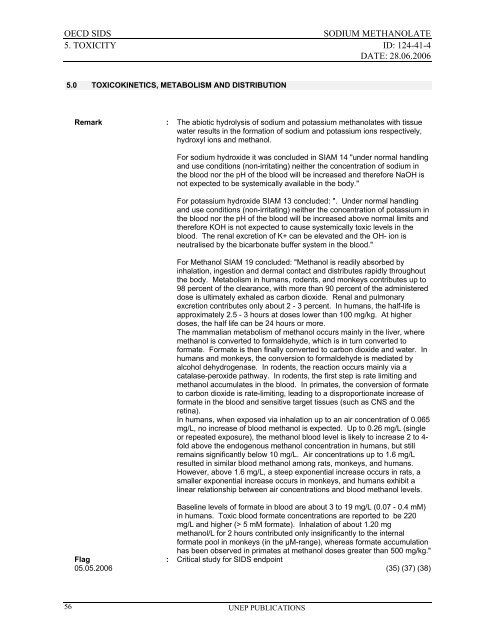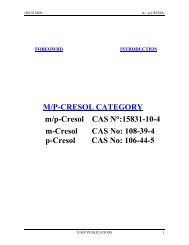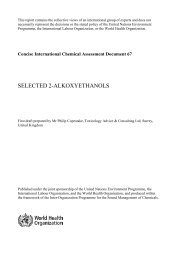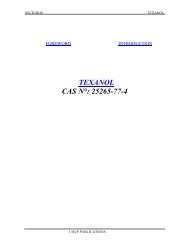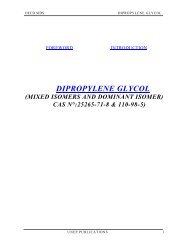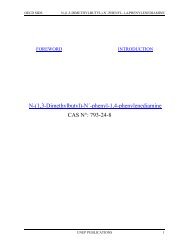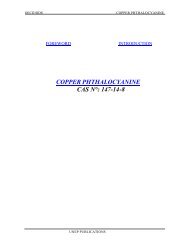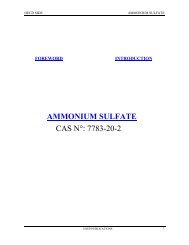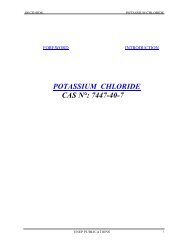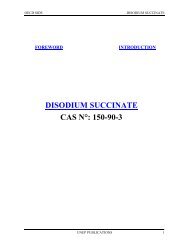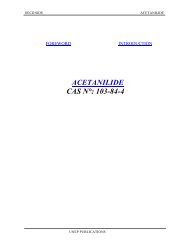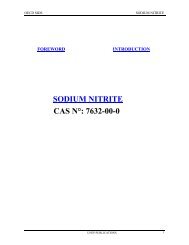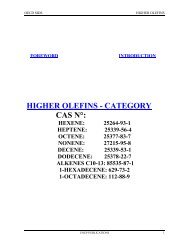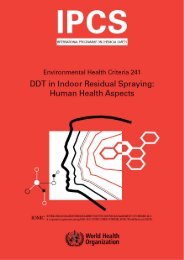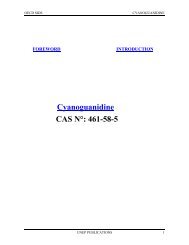Sodium methanolate - ipcs inchem
Sodium methanolate - ipcs inchem
Sodium methanolate - ipcs inchem
Create successful ePaper yourself
Turn your PDF publications into a flip-book with our unique Google optimized e-Paper software.
OECD SIDS<br />
SODIUM METHANOLATE<br />
5. TOXICITY ID: 124-41-4<br />
DATE: 28.06.2006<br />
5.0 TOXICOKINETICS, METABOLISM AND DISTRIBUTION<br />
Remark : The abiotic hydrolysis of sodium and potassium <strong>methanolate</strong>s with tissue<br />
water results in the formation of sodium and potassium ions respectively,<br />
hydroxyl ions and methanol.<br />
For sodium hydroxide it was concluded in SIAM 14 "under normal handling<br />
and use conditions (non-irritating) neither the concentration of sodium in<br />
the blood nor the pH of the blood will be increased and therefore NaOH is<br />
not expected to be systemically available in the body."<br />
For potassium hydroxide SIAM 13 concluded: ". Under normal handling<br />
and use conditions (non-irritating) neither the concentration of potassium in<br />
the blood nor the pH of the blood will be increased above normal limits and<br />
therefore KOH is not expected to cause systemically toxic levels in the<br />
blood. The renal excretion of K+ can be elevated and the OH- ion is<br />
neutralised by the bicarbonate buffer system in the blood."<br />
For Methanol SIAM 19 concluded: "Methanol is readily absorbed by<br />
inhalation, ingestion and dermal contact and distributes rapidly throughout<br />
the body. Metabolism in humans, rodents, and monkeys contributes up to<br />
98 percent of the clearance, with more than 90 percent of the administered<br />
dose is ultimately exhaled as carbon dioxide. Renal and pulmonary<br />
excretion contributes only about 2 - 3 percent. In humans, the half-life is<br />
approximately 2.5 - 3 hours at doses lower than 100 mg/kg. At higher<br />
doses, the half life can be 24 hours or more.<br />
The mammalian metabolism of methanol occurs mainly in the liver, where<br />
methanol is converted to formaldehyde, which is in turn converted to<br />
formate. Formate is then finally converted to carbon dioxide and water. In<br />
humans and monkeys, the conversion to formaldehyde is mediated by<br />
alcohol dehydrogenase. In rodents, the reaction occurs mainly via a<br />
catalase-peroxide pathway. In rodents, the first step is rate limiting and<br />
methanol accumulates in the blood. In primates, the conversion of formate<br />
to carbon dioxide is rate-limiting, leading to a disproportionate increase of<br />
formate in the blood and sensitive target tissues (such as CNS and the<br />
retina).<br />
In humans, when exposed via inhalation up to an air concentration of 0.065<br />
mg/L, no increase of blood methanol is expected. Up to 0.26 mg/L (single<br />
or repeated exposure), the methanol blood level is likely to increase 2 to 4-<br />
fold above the endogenous methanol concentration in humans, but still<br />
remains significantly below 10 mg/L. Air concentrations up to 1.6 mg/L<br />
resulted in similar blood methanol among rats, monkeys, and humans.<br />
However, above 1.6 mg/L, a steep exponential increase occurs in rats, a<br />
smaller exponential increase occurs in monkeys, and humans exhibit a<br />
linear relationship between air concentrations and blood methanol levels.<br />
Baseline levels of formate in blood are about 3 to 19 mg/L (0.07 - 0.4 mM)<br />
in humans. Toxic blood formate concentrations are reported to be 220<br />
mg/L and higher (> 5 mM formate). Inhalation of about 1.20 mg<br />
methanol/L for 2 hours contributed only insignificantly to the internal<br />
formate pool in monkeys (in the µM-range), whereas formate accumulation<br />
has been observed in primates at methanol doses greater than 500 mg/kg."<br />
Flag : Critical study for SIDS endpoint<br />
05.05.2006 (35) (37) (38)<br />
56<br />
UNEP PUBLICATIONS


